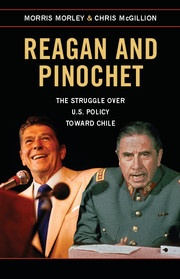1 - In from the Cold
Published online by Cambridge University Press: 05 February 2015
Summary
The Reagan administration came into office so determined to reverse the tone and nature of U.S. foreign policy as it had developed under President Jimmy Carter that one senior official in the ARA imagined his new superiors “felt that they were conducting a hostile takeover.” The atmosphere, he said, “was very much that nobody here could be trusted.” Transition team members, recalled Carter’s Deputy Assistant for National Security Affairs David Aaron, “were not interested in being briefed on anything.” Robert Pastor, the NSC’s Latin American staffer, encountered the icy nature of the transition environment in a meeting with incoming NSC Adviser Richard Allen: “Even though these people who were coming in represented much of what I disagreed with, I felt that as an American official I should be prepared to help them and brief them. Not only did Dick Allen express disinterest at best but he said to me ‘You’d better be out of that office at noon on January 20 or police are going to come and take you out of that office.’” On the other hand, Reagan’s Secretary of State, Alexander Haig, had quite a different view of the transition dynamics. “I found no great enthusiasm in the Department of State for the Reagan Administration,” he would later write. “The fear was abroad that a legion of right-wing activists was going to march in and start conducting American diplomacy according to the rules of a political rally.” The predominant view of Carter’s Latin American policy among the newcomers, according to a senior career Foreign Service Officer at the time, was that it had angered political allies, especially military regimes, and that “we should stop meddling and telling them what they ought to do with respect to their own internal situations and human rights. They were good anti-communists and wanted to be our friends. We should make the most of it.”
- Type
- Chapter
- Information
- Reagan and PinochetThe Struggle over US Policy toward Chile, pp. 26 - 67Publisher: Cambridge University PressPrint publication year: 2015



